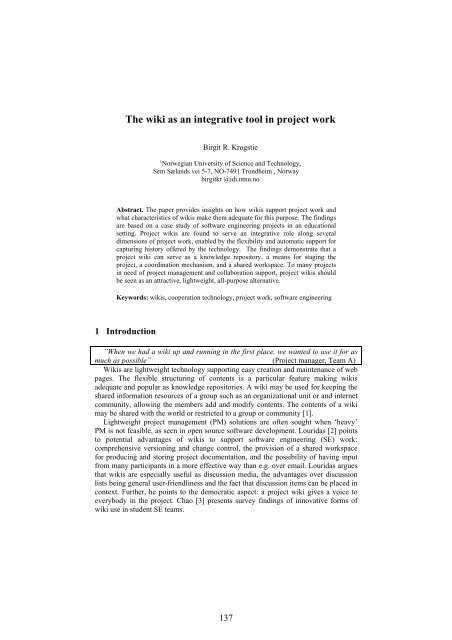The work-reflection-learning cycle - Department of Computer and ...
The work-reflection-learning cycle - Department of Computer and ...
The work-reflection-learning cycle - Department of Computer and ...
You also want an ePaper? Increase the reach of your titles
YUMPU automatically turns print PDFs into web optimized ePapers that Google loves.
<strong>The</strong> wiki as an integrative tool in project <strong>work</strong><br />
Birgit R. Krogstie<br />
1<br />
Norwegian University <strong>of</strong> Science <strong>and</strong> Technology,<br />
Sem Sæl<strong>and</strong>s vei 5-7, NO-7491 Trondheim , Norway<br />
birgitkr @idi.ntnu.no<br />
Abstract. <strong>The</strong> paper provides insights on how wikis support project <strong>work</strong> <strong>and</strong><br />
what characteristics <strong>of</strong> wikis make them adequate for this purpose. <strong>The</strong> findings<br />
are based on a case study <strong>of</strong> s<strong>of</strong>tware engineering projects in an educational<br />
setting. Project wikis are found to serve an integrative role along several<br />
dimensions <strong>of</strong> project <strong>work</strong>, enabled by the flexibility <strong>and</strong> automatic support for<br />
capturing history <strong>of</strong>fered by the technology. <strong>The</strong> findings demonstrate that a<br />
project wiki can serve as a knowledge repository, a means for staging the<br />
project, a coordination mechanism, <strong>and</strong> a shared <strong>work</strong>space. To many projects<br />
in need <strong>of</strong> project management <strong>and</strong> collaboration support, project wikis should<br />
be seen as an attractive, lightweight, all-purpose alternative.<br />
Keywords: wikis, cooperation technology, project <strong>work</strong>, s<strong>of</strong>tware engineering<br />
1 Introduction<br />
”When we had a wiki up <strong>and</strong> running in the first place, we wanted to use it for as<br />
much as possible” (Project manager, Team A)<br />
Wikis are lightweight technology supporting easy creation <strong>and</strong> maintenance <strong>of</strong> web<br />
pages. <strong>The</strong> flexible structuring <strong>of</strong> contents is a particular feature making wikis<br />
adequate <strong>and</strong> popular as knowledge repositories. A wiki may be used for keeping the<br />
shared information resources <strong>of</strong> a group such as an organizational unit or <strong>and</strong> internet<br />
community, allowing the members add <strong>and</strong> modify contents. <strong>The</strong> contents <strong>of</strong> a wiki<br />
may be shared with the world or restricted to a group or community [1].<br />
Lightweight project management (PM) solutions are <strong>of</strong>ten sought when ‘heavy’<br />
PM is not feasible, as seen in open source s<strong>of</strong>tware development. Louridas [2] points<br />
to potential advantages <strong>of</strong> wikis to support s<strong>of</strong>tware engineering (SE) <strong>work</strong>:<br />
comprehensive versioning <strong>and</strong> change control, the provision <strong>of</strong> a shared <strong>work</strong>space<br />
for producing <strong>and</strong> storing project documentation, <strong>and</strong> the possibility <strong>of</strong> having input<br />
from many participants in a more effective way than e.g. over email. Louridas argues<br />
that wikis are especially useful as discussion media, the advantages over discussion<br />
lists being general user-friendliness <strong>and</strong> the fact that discussion items can be placed in<br />
context. Further, he points to the democratic aspect: a project wiki gives a voice to<br />
everybody in the project. Chao [3] presents survey findings <strong>of</strong> innovative forms <strong>of</strong><br />
wiki use in student SE teams.<br />
137
















